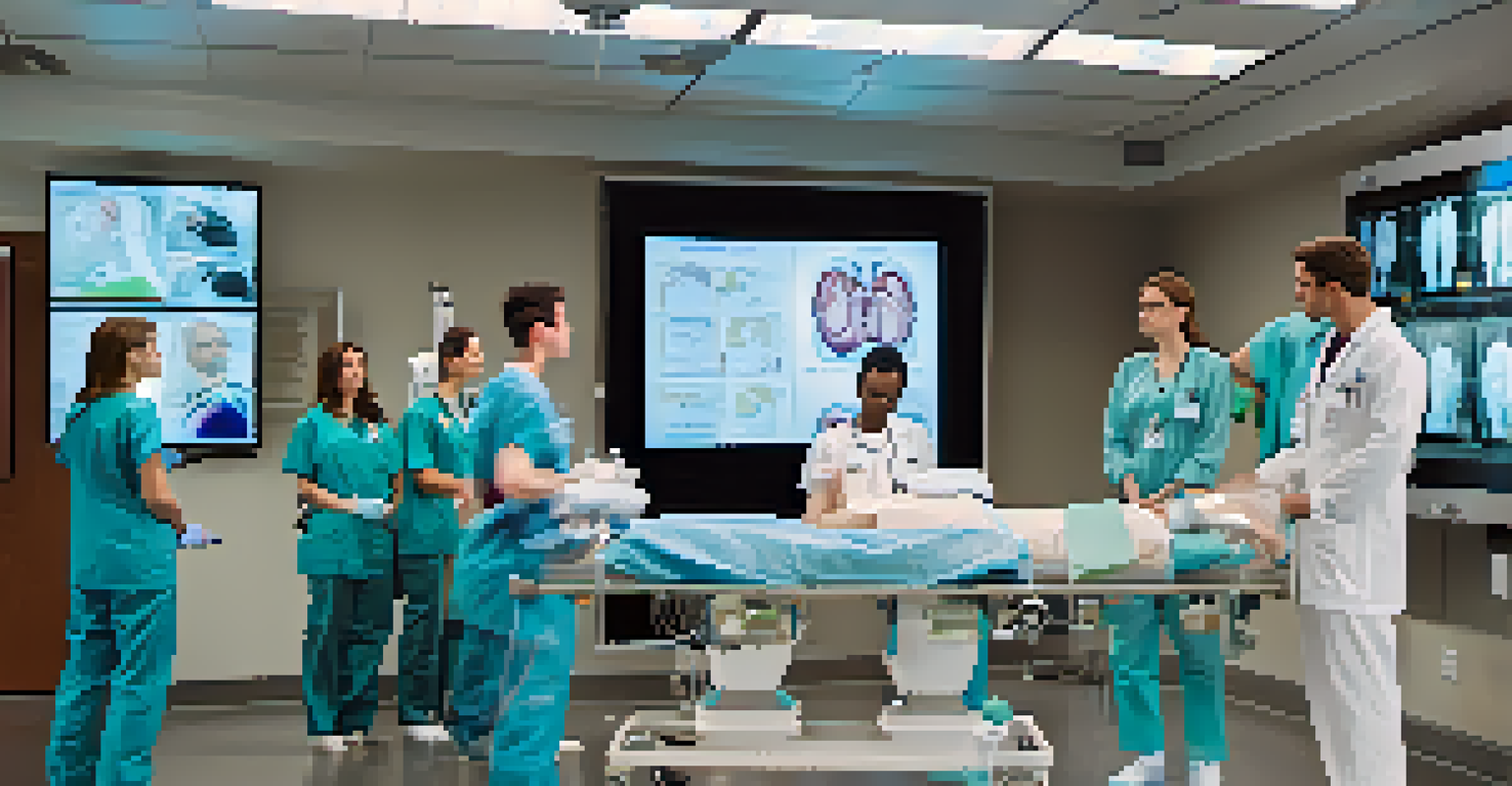Training and Education Pathways in Emergency Medicine

Understanding the Role of Emergency Medicine
Emergency medicine (EM) is a vital specialty that focuses on diagnosing and treating acute medical conditions. Practitioners, known as emergency physicians, work in high-pressure environments, often being the first point of contact for patients in urgent need. Their role not only involves clinical expertise but also requires excellent decision-making skills under stress.
Emergency medicine is a specialty that requires a delicate balance of skill, knowledge, and quick decision-making in the face of life and death.
This specialty is unique because it encompasses a wide range of medical issues, from trauma and cardiac emergencies to infectious diseases. Emergency physicians must be adept at multitasking and prioritizing care based on the severity of each patient's condition. This dynamic environment makes EM an exciting and fulfilling field for many healthcare professionals.
As healthcare evolves, so does the scope of emergency medicine. With advancements in technology and treatment protocols, emergency physicians are continuously learning and adapting. Understanding this role is crucial for anyone considering a career in this fast-paced specialty.
Educational Requirements for Aspiring Emergency Physicians
To pursue a career in emergency medicine, one typically starts with a bachelor's degree, often in a science-related field. Following this, aspiring doctors must complete four years of medical school to earn their Doctor of Medicine (MD) or Doctor of Osteopathic Medicine (DO) degree. This foundational education is critical for understanding the complexities of human health and disease.

After medical school, graduates enter a residency program in emergency medicine, which typically lasts three to four years. During this period, residents gain hands-on experience in various clinical settings, honing their skills in critical care, trauma management, and patient assessment. This is where theoretical knowledge meets practical application, preparing them for real-world challenges.
Emergency Medicine's Vital Role
Emergency physicians are essential for diagnosing and treating acute medical conditions in high-pressure environments.
Continuing education is essential in emergency medicine due to rapid advancements in medical knowledge and technology. Many emergency physicians pursue board certification, which requires passing a rigorous examination and committing to ongoing learning throughout their careers.
The Importance of Residency Training in EM
Residency training is a pivotal phase in the journey to becoming an emergency physician. It provides an immersive experience where medical graduates work under supervision in emergency departments, gaining invaluable insights and skills. Residents encounter a diverse array of cases, which helps them build confidence and competence.
Education is the most powerful weapon which you can use to change the world.
During residency, physicians learn to recognize and manage critical conditions while developing their ability to work as part of a team. They also engage in simulations and training exercises that prepare them for high-pressure situations. This hands-on experience is crucial, as it shapes their clinical judgment and enhances their problem-solving abilities.
Moreover, residency fosters mentorship relationships with seasoned professionals, offering guidance and support. This network can be beneficial for career development, providing residents with resources and advice as they transition into independent practice.
Fellowship Opportunities in Emergency Medicine
For those looking to specialize further, fellowship programs offer advanced training in specific areas of emergency medicine. Common fellowships include topics like emergency medical services, toxicology, or sports medicine. These programs typically last one to two years and provide in-depth knowledge and skills that go beyond general EM training.
Participating in a fellowship allows physicians to become experts in their chosen niche, enhancing their career prospects and contributions to the field. It also opens up opportunities for academic roles, research, and leadership positions within healthcare organizations. Fellowships are a great way to explore specialized interests and make a significant impact in those areas.
Rigorous Training Requirements
Aspiring emergency physicians must complete extensive education, including a medical degree and specialized residency training.
Additionally, fellowship-trained emergency physicians often engage in teaching and mentoring roles, helping to shape the next generation of doctors. This cycle of education and mentorship strengthens the field of emergency medicine, ensuring high standards of care and innovation.
Certifications and Licensure in Emergency Medicine
Certification and licensure are crucial components of practicing emergency medicine. After completing residency training, physicians must obtain a medical license from the state where they intend to practice. This process typically involves passing a series of examinations to demonstrate their medical knowledge and competency.
In addition to state licensure, many emergency physicians pursue board certification from the American Board of Emergency Medicine (ABEM) or similar organizations. Board certification signifies that a physician has met rigorous standards and is committed to quality patient care. Maintaining this certification requires ongoing education and assessment, ensuring physicians stay current in the field.
These certifications not only enhance a physician's credibility but also improve job prospects and opportunities for advancement. Employers often prefer or require board-certified candidates, making it a valuable step in a physician's career.
Continuing Education and Lifelong Learning in EM
The field of emergency medicine is constantly evolving, making continuing education an essential aspect of a physician's career. Emergency physicians must stay updated on the latest guidelines, technologies, and best practices to provide the highest level of care. This commitment to lifelong learning is not just beneficial; it's a professional responsibility.
Various avenues exist for continuing education, including conferences, workshops, and online courses. Many organizations offer resources designed specifically for emergency medicine practitioners, providing access to cutting-edge research and training modules. In addition to formal education, participating in peer discussions and case reviews can enhance knowledge and skills.
Diverse Career Opportunities
Emergency medicine offers various paths, including clinical practice, research, and leadership roles, allowing physicians to impact patient care significantly.
Moreover, some emergency physicians take on teaching roles within residency programs or at medical schools. Sharing their expertise not only reinforces their own knowledge but also contributes to the growth of the next generation of emergency medicine providers.
Career Paths within Emergency Medicine
Emergency medicine offers a variety of career paths beyond clinical practice. While many physicians work in emergency departments, others may choose to focus on academic medicine, research, or administrative roles. Each of these paths provides unique opportunities to impact patient care and advance the specialty.
For instance, some emergency physicians engage in research to improve treatment protocols or develop new techniques. This research can lead to innovations that enhance patient outcomes and shape the future of emergency care. Academic roles allow physicians to teach and mentor, contributing to the education of upcoming doctors.

Additionally, some physicians move into leadership positions within healthcare organizations, where they can influence policy and improve systems of care. These diverse career paths reflect the versatility of emergency medicine and allow practitioners to find their niche within this dynamic field.